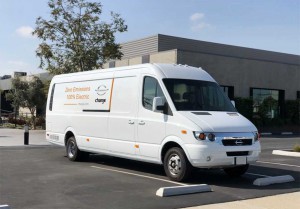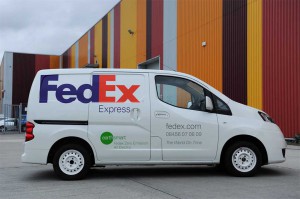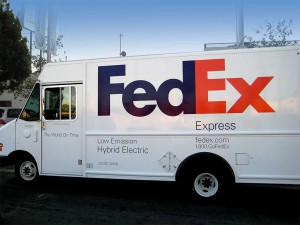FedEx Corp. is plugging into battery power, the delivery service announcing today it will add 1,000 Chinese-made vans to its fleet as part of a commitment to reduce both energy consumption and vehicle emissions.
It joins a growing list of delivery services, including UPS and Deutsche Post, that are testing out the capabilities of fully electric trucks for use on both short and long-haul routes.
“FedEx continually seeks new ways to maximize operational efficiency, minimize impacts and find innovative solutions through the company’s Reduce, Replace, Revolutionize approach to sustainability,” said Mitch Jackson, FedEx Chief Sustainability Officer. “Our investment in these vehicles is part of our commitment to that approach of serving our customers and connecting the world responsibly and resourcefully.”
The delivery company said it will directly purchase 100 Chanje V8100 vans and lease the rest from the truck rental service Ryder System Inc. The vans are being supplied by a Los Angeles-based start-up. They are produced in Hangzhou, China, by the firm’s primary investor, FDG Electric Vehicles Ltd.
(Brown goes green — fleets test high tech envelope. Click Here for the story.)
Chanje originally estimated the medium-duty panel vans will be capable of running up to 65 miles between charges with a full, 6,000-pound payload. Range jumps to 100 miles with a 3,000-pound load when the van was introduced, but improvements to the battery pack appear to have boosted that to 150 miles, according to FedEx. At the same time, the truck’s cargo bay has grown from 580 to 675 cubic feet.
Interest in all-electric delivery vehicles has been growing rapidly, and companies like FedEx believe they could get by with relatively limited range on many of their routes – though FedEx hopes to prove it out with this test program. The Memphis, Tennessee-based company has been experimenting with battery-based technology for several years. It has been testing an all-electric version of the Nissan NV van, as well as more conventional gas-electric hybrid trucks.
(Click Here for more about Nissan and EVgo’s new 500-mile charging network.)
Chanje is hoping to take advantage of this boom and is exploring the idea of building a U.S. assembly plant if demand grows. That would help the company sidestep the Trump Administration’s trade war which has put hefty new tariffs on Chinese-made vehicles.
But Chanje is just one of a number of truck manufacturers entering the battery market. That includes established vehicle makers like Germany’s Daimler AG, which is launching a mixed fleet of short, medium and long-haul electrics through its various brands, including U.S.-based Freightliner. It recently introduced the all-electric eCascadia semi, as well as the smaller eM2, the latter claiming about 230 miles of range.
Volvo and Volkswagen are also entering the all-electric truck market, as are start-ups like Workhorse, which is located in Cincinnati. And Tesla is getting ready to roll out a fully-electric Semi, a Class 8 truck expected to have an 80,000-pound capacity and a range of up to 500 miles.
(BCG study forecasts 50% of vehicles sold in 2030 will be “electrified.” For the story, Click Here.)
FedEx has so far placed orders for 20 of the Tesla Semis.



